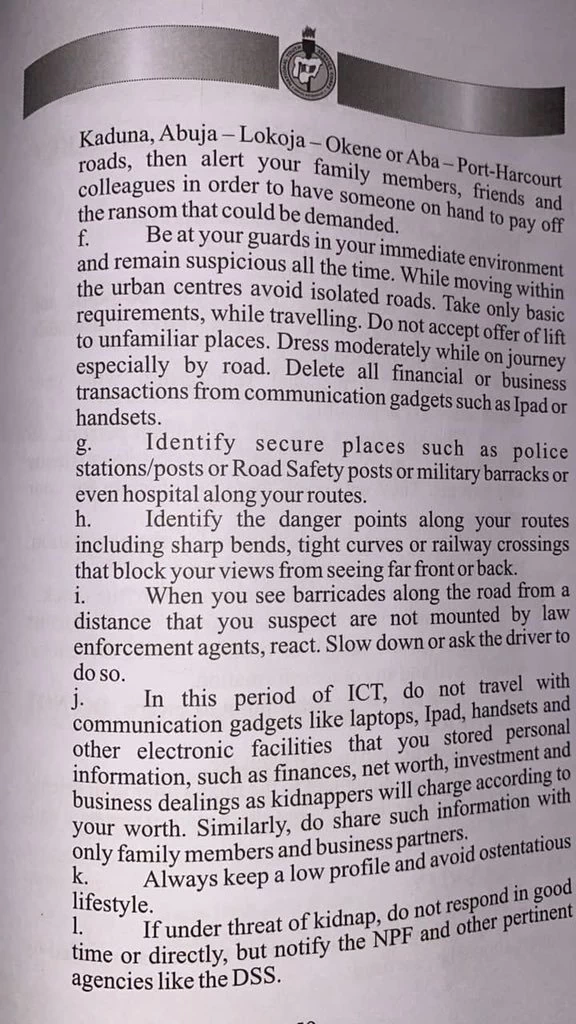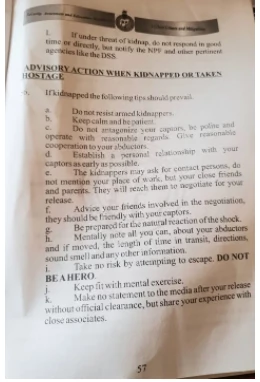The NYSC says its handbook does not contain any clause asking corps members to alert their families to prepare ransom, but serving corps members have proof.
The management of the National Youth Service Corps (NYSC) has denied advising corps members in the handbook it issued to serving youths to alert their families and friends to prepare ransom in case they are kidnapped.
According to several reports earlier that a section of the agency’s handbook addresses the possibility of serving corps members getting kidnapped when travelling on high-risk roads.
In the handbook, the Scheme listed “Abuja-Kaduna, Abuja-Lokoja-Okene, or Aba-Port Harcourt” as some of the roads, where they could be kidnapped.
The handbook titled, ‘Security Awareness and Education Handbook For Corps Members and Staff’ expressly asked corps members on page 59 to “alert your family members, friends and colleagues, in order to have someone on hand to pay off the ransom that could be demanded.”
On the same page, the NYSC warned serving corps members against travelling with communication gadgets like laptops and cell phones because kidnappers would charge them according to their worth.

“In this period of ICT, do not travel with communication gadgets like laptops, iPad, handsets, and other electronic facilities that you stored personal information such as finances, net worth, investment, and business dealings as kidnappers will charge according to your worth.” the handbook reads.
Moreover, a corps member serving in Oyo state told this writer that the advice is contained in the handbook the scheme issued to members of the Batch B Stream II that recently completed their orientation exercise.

Another section of the handbook obtained by this writer from a serving corps member advises corps members to cooperate with their abductors and should not antagonise them or try to escape from captivity.
The section reads, “Do not antagonise your captors, be polite and operate with reasonable regards. Give reasonable cooperation to your abductors.
“Establish a personal relationship with your abductors as soon as possible.
“The kidnappers may ask for contact persons, do not mention your place of work, but your close friends and parents. They will reach them to negotiate for your release.
“Advise your friends involved in the negotiations, they should be friendly with the captors.
“Take no risk by attempting to escape. DO NOT BE A HERO.
“Make no statement to the media after your release without official clearance but share your experience with close associates.

Even though thousands of serving corps members across the country have the pamphlet containing the advice, the NYSC management has refuted the content of the handbook.
In a statement on Thursday, the NYSC said the handbook was written by respected retired security experts, adding that the pamphlet does not contain any clause asking corps members to alert their families to prepare ransom in the event of being kidnapped.
The statement reads; “The attention of Management of the National Youth Sevice Corps has been drawn to a fake release making the rounds on the social media to the effect that Corps Members travelling on “high-risk roads” should alert their families, friends and colleagues in order to have somebody to pay off the ransom that could be demanded in the event of being kidnapped.
The management wishes to emphatically state that the clause quoted is not embedded in NYSC Security Tips pamphlet which was put together by a highly respected retired security expert.
The management wishes to appeal to the general public to always clarify issues with the Scheme.
Please, be wary of falling prey to the antics of mischief-makers out to ridicule the Scheme.
Management shall continue to prioritise the security and welfare of Corps Members and staff at all times.”
Meanwhile, many Nigerians called on lawyers to sue the Federal Government for putting the lives of Nigerian youths in danger through the NYSC scheme and denying responsibilities when casualties arise.
Others have asked the government to scrap the Scheme saying it is no longer serving the purpose for which it was established in 1973.
Source: https://www.pulse.ng/












